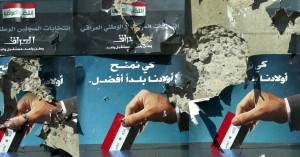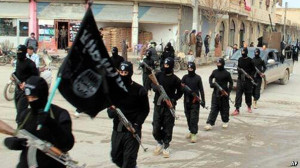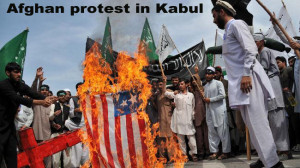 Nothing affirms the proposition that only authoritarian regimes can govern Arab countries quite like the very Egyptians who protested against the authoritarian regime of Hosni Mubarak being the ones now cheering for the authoritarian regime of General Abdel Fattah al-Sisi. Especially given that al-Sisi seized power from the country’s first democratically elected government of Mohamed Morsi in a military coup last summer.
Nothing affirms the proposition that only authoritarian regimes can govern Arab countries quite like the very Egyptians who protested against the authoritarian regime of Hosni Mubarak being the ones now cheering for the authoritarian regime of General Abdel Fattah al-Sisi. Especially given that al-Sisi seized power from the country’s first democratically elected government of Mohamed Morsi in a military coup last summer.
al-Sisi is ruling Egypt in a manner that makes Mubarak and Morsi look like Boy Scouts. [This] vindicates my early criticism of pro-democracy protesters [who gave no thought about the devil they knew in Mubarak being better than the devil they did not know in Morsi or al-Sisi….
(“Egypt’s Arab Spring Spawns Brutal Military Dictatorship,” The iPINIONS Journal, March 25, 2014)
No less affirming, though, is the ungovernable mess Iraq has become. Recall that, after overthrowing the authoritarian regime of Saddam Hussein in 2003, the United States declared that it was on a mission to:
Build a democratic Iraq that can govern itself, sustain itself, and defend itself.
(Washington Post, April 3, 2007)
Yet, when the United States ended its mission in December 2011, Iraq did not even qualify as a “flawed democracy,” let alone a “full democracy” – as the United States clearly intended… indeed promised. This assertion is based on The Economist Intelligence Unit’s “Democracy Index of 2013”:
The overall Democracy index is based on five categories: electoral process and pluralism; civil liberties; the functioning of government; political participation; and political culture. Countries are placed within one of four types of regimes: full democracies; flawed democracies; hybrid regimes; and authoritarian regimes.
 So, far from leaving with its “Mission Accomplished,” the United States left with its mission a notorious, disastrous and ominous failure.
So, far from leaving with its “Mission Accomplished,” the United States left with its mission a notorious, disastrous and ominous failure.
In fact, Iraq has never been classified as anything more than a “hybrid regime” (i.e., one that allows “flawed” democratic elections but restricts democratic freedoms and civil society).
It’s arguable, however, that the Institute of Economics and Peace’s “Peace Index of 2013” is far more significant. Not least because it measures the “security in society,” which is not only the most existential category, but the one without which the EIU’s categories (of civil liberties, political participation, etc.) are simply irrelevant.
Therefore, it speaks volumes that, on the IEP’s index, several countries with authoritarian regimes, like the United Arab Emirates, rank higher than those with democratic governments, like the United States.
Which brings me back to Iraq and its fledgling democracy:
Iraq is suffering its worst violence in years, and with none of the myriad problems that contribute to the heightened unrest headed for quick resolutions, the bloodshed is likely to continue unabated.
(Agence France-Presse, June 8, 2014)
 Just yesterday, Iraq’s democratically elected prime minister, Nuri al-Maliki, was making hollow pledges to combat Islamic militants who had just seized control of Mosul, the country’s second largest city. Hollow because al-Maliki made similar pledges in January after these same militants – comprised of al-Qaeda acolytes calling themselves, variously, Islamic State of Iraq and Syria (ISIS) or Islamic State of Iraq and the Levant (ISIL) – seized control of Fallujah, a key city in western Iraq, which remains firmly under their control.
Just yesterday, Iraq’s democratically elected prime minister, Nuri al-Maliki, was making hollow pledges to combat Islamic militants who had just seized control of Mosul, the country’s second largest city. Hollow because al-Maliki made similar pledges in January after these same militants – comprised of al-Qaeda acolytes calling themselves, variously, Islamic State of Iraq and Syria (ISIS) or Islamic State of Iraq and the Levant (ISIL) – seized control of Fallujah, a key city in western Iraq, which remains firmly under their control.
(Recall that U.S. forces fought two battles to wrest control of Fallujah from insurgents in 2004. The second one was “the bloodiest battle in the entire war,” during which 95 U.S. troops were killed and 560 wounded.)
When the truth is plain to see, there’s nothing more irritating than some idiot trying to convince me otherwise. But the consequences for me in such cases have never been anything to lose sleep – let alone my life – over. Alas, the same cannot be said for the families of loved ones serving in Iraq. Because they must suffer far more than irritation when idiots – up and down the chain of command in the Bush Administration – try to convince them that reports of Iraq being a lost cause are not true…
Yesterday marked the 3rd Anniversary of the invasion of Iraq. And, if I were gullible enough to take President Bush and his salute-and-obey generals at their word, I would have expected to see Yankee Doodle-inspired parades in the streets of Baghdad – as grateful Iraqis fête U.S. military and civilian personnel with “rose petals and air kisses” for their liberation. The truth, of course, is that neither U.S. personnel nor most Iraqis dare walk the streets of Baghdad for fear of being caught in the crossfire of civil-war factions battling for control of this and other cities all over Iraq.
But, imagine the absurdity, indeed the tragedy, of Ayad Allawi, the man the U.S. Congress hailed as the Abraham Lincoln of Iraq just 16 months ago, now proclaiming that stabilizing Iraqi is a lost cause, yet having Oval-office generals like Bush and VP Cheney trying to convince him and the world otherwise….
(“Civil War in Iraq Is at Hand,” The iPINIONS Journal, March 20, 2006)
The point is that there was clearly far greater security in Iraq under Saddam Hussein’s 24-year authoritarian regime, as well as in Egypt under Hosni Mubarak’s 30-year authoritarian regime, than there has been under the democratically elected governments that succeeded them. Indeed, one can hardly blame Iraqis for now emulating Egyptians by pining for the return of an authoritarian regime to restore peace and security.
 Beyond this, it’s instructive, perhaps even predictive, that Arab countries dominate the list of 51 countries governed by authoritarian regimes (whether military, monarchical, or clerical); whereas Western countries dominate the list of 25 countries governed by full democracies. In other words, show me an Arab country governed by a democratically elected government and I’ll show you one that is an ungovernable mess.
Beyond this, it’s instructive, perhaps even predictive, that Arab countries dominate the list of 51 countries governed by authoritarian regimes (whether military, monarchical, or clerical); whereas Western countries dominate the list of 25 countries governed by full democracies. In other words, show me an Arab country governed by a democratically elected government and I’ll show you one that is an ungovernable mess.
Incidentally, the primary cause of this mess is the sectarian conflict between Sunni and Shia Muslims that has been simmering in Arab countries since time immemorial, which only authoritarian regimes seem willing and/or able to keep a lid on. But ethnic conflict is often a contributing (or even the precipitating) cause, despite Arab countries being some of the most ethnically homogenous in the world.
 Of course, most glaring in this context is the fact that, after almost 13 years of trying to build an Afghanistan that can govern itself, sustain itself, and defend itself, security there today is no greater than it is in Iraq. Nothing demonstrates this quite like the Taliban – whose authoritarian regime U.S. forces ousted 13 years ago – being so insurgent that they seem destined to destabilize the democratically elected government of Afghanistan with even greater speed and ease (after the United States ends it mission in 2015) than Iraqi insurgents are destabilizing the democratically elected government of Iraq.
Of course, most glaring in this context is the fact that, after almost 13 years of trying to build an Afghanistan that can govern itself, sustain itself, and defend itself, security there today is no greater than it is in Iraq. Nothing demonstrates this quite like the Taliban – whose authoritarian regime U.S. forces ousted 13 years ago – being so insurgent that they seem destined to destabilize the democratically elected government of Afghanistan with even greater speed and ease (after the United States ends it mission in 2015) than Iraqi insurgents are destabilizing the democratically elected government of Iraq.
Not to mention how emboldened the Taliban had to have become after forcing the United States just 10 days ago to release five of its top leaders from Guantanamo Bay in exchange for Bowe Bergdahl, the one American POW they held captive for the past five years.
And don’t get me started on the continuing folly of U.S. troops doing little more these days than providing human target practice for the Afghan troops they’re supposed to be training to fight the Taliban; or on the fatal irony of Taliban fighters so spooking U.S. troops that, just yesterday, they opened fire on fellow U.S. troops in a “friendly fire” incident that killed another five of them … for a cause that was already lost over 10 years ago.
Frankly, I warned it would be thus, for example, here:
The irony is not lost on me that McCrystal’s grim assessment [that with or without more troops failure in Afghanistan is likely] makes it woefully clear that nation building in Afghanistan (even under the guise of a ‘counterinsurgency strategy’) is no longer advisable or feasible. Indeed, all indications are that the die has been cast for this ‘good war.’
Accordingly, the U.S. legacy there will be distinguished either by a terminally wounded national pride as American forces beat a hasty retreat in defeat (following the Russian precedent), or by thousands of American soldiers being committed to Afghanistan’s ‘graveyard of empires’ as it continues fighting this unwinnable war (following its own Vietnam precedent). And more troops only mean more sitting ducks for Taliban fighters.
(“With or Without More Troops, Failure in Afghanistan Is Likely,” The iPINIONS Journal, September 23, 2009)
And here:
I declared from the outset that it was a march of folly to send big American land armies into Afghanistan and Iraq. After all, a few Special Forces aided by drones and cruise missiles could have exacted all of the retribution Americans could have wanted against Afghanistan’s Taliban and al-Qaeda for 9/11 in the first instance, and all of the revenge President Bush could have wanted against Iraq’s Saddam Hussein for attempting to assassinate his daddy in the second.
(“Invading Iraq and Afghanistan Was Insane,” The iPINIONS Journal, March 1, 2011)
 Meanwhile, regarding wasted blood and treasure: according to the Washington Post’s ongoing feature “Faces of the Fallen,” as of April 2014, the United States had already lost 6,805 soldiers trying to build “full democracies” in Iraq and Afghanistan; and a 2013 study from Harvard University estimates that, by the time the United States retreats from Afghanistan next year, it will have spent upwards of $6 trillion trying to do so.
Meanwhile, regarding wasted blood and treasure: according to the Washington Post’s ongoing feature “Faces of the Fallen,” as of April 2014, the United States had already lost 6,805 soldiers trying to build “full democracies” in Iraq and Afghanistan; and a 2013 study from Harvard University estimates that, by the time the United States retreats from Afghanistan next year, it will have spent upwards of $6 trillion trying to do so.
Not to mention the more than one hundred thousand Iraqi and Afghan civilians who lost their lives in the Bush Administration’s ill-fated attempt to reform their respective countries in America’s image.
More to the point, though, prevailing and credible fears that ISIS/ISIL terrorists are on the march and the Taliban fighters are just lying in wait to topple democratic governments in Iraq and Afghanistan, respectively, not only make a mockery of U.S. nation-building efforts, but also betray the fact that those efforts (manifested in blood expended and treasure spent) were all in vain….
NOTE: My weblog is replete with commentaries on events unfolding in Iraq and Afghanistan, as well as with commentaries presaging them. Therefore, I shall have no further comment.
Related commentaries:
Egypt’s Arab Spring…
Civil war in Iraq…
Obama ends war in Iraq
U.S. leaving Afghanistan…
Taliban prison swap…
Invading Iraq and Afghanistan…